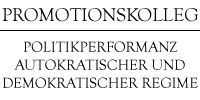Josie-Marie Perkuhn
Josie-Marie Perkuhn
Josie-Marie Perkuhn studied Political Science and Chinese Studies in Heidelberg, Shanghai and Chengdu. She focused her studies on International Relations, Foreign Policy Analysis, Area Studies, as well as Chinese Philosophy, Religion, and legal traditions. She graduated in spring 2012. Her Master’s thesis focused on the juridification of international relations and the People’s Republic of China (PRC). After graduation, she worked as a teaching assistant for the Institute of Chinese Studies and a project manager for a training cooperation Taiwanese Executive Learning Program TELP at the Institute of Political Science. Currently, she is a member of a research training group named Policy Performace of Autocratic and Democratic Regimes hosted by the Institute of Political Science at Heidelberg University. For a detailed curricula vitae can be found here.
Research Project: "The People's Republic of China and International Organisations“ (Working title)
The emerging China increased its economic and political influence on international politics and that has sparked a polarized debate about the People’s Republics foreign policy role in terms of its conflicting or cooperative integration process. Given the autocratic one-party regime, China has shown a remarkable persistence, which is relatively stable in performance; however, non-transparent in terms of decision-making. In context of international legalization China has shown a rather differentiated integration that has reassert security policy concerns up to the end, whether China will present itself as a rival or partner. Dominant approaches investigate to what extend China will be subject to (Western) socialization or object predominant norms to present a rather autocratic alternative. The research project builds on this interface and examines based on a social constructive role theory approach whether the PRC is prone to integrate in fields of economy and environment. The central argument lies in the causal dependency between foreign policy roles within social informed intra-party groups and the variant international integration The more divergent those role concepts are, the more they will be subject to domestic contestation and the more conflicting the national discourse the more diffuse is the perceived integration behavior. Preliminary results indicate that a shift in material cooperation structure lead to a re-evaluation of China’s international partners who also influence on China’s counter-role giver and successively lead to differentiation of China’s foreign policy role set.
Academic Supervisor: Prof. Dr. Sebastian Harnisch


